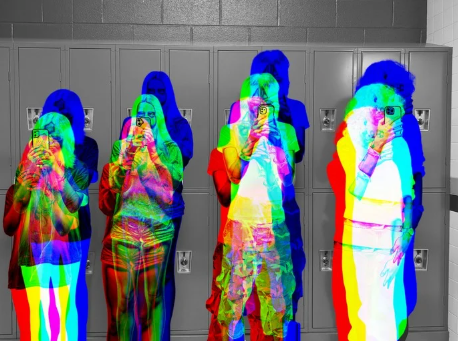
Isabel Shultz
The phone ban from the eyes of students.
From the Governor to our school administrators, students’ opinions for the creation of a phone ban in schools have largely been ignored. Yet, students have been the ones most affected by the phone policy.
This ignorance has caused many students frustration, including junior Alan van der Sluis who states, “We are not robots, nor ’academic scholars’, or ‘young people,’ we are valued parts of the community, and to disregard our voice is to disregard the student body.”
Most of the students’ issues with the phone policy are inability to communicate, lack of safety, enforcement by the administration and the extent of the policy.
Inability to Communicate
One very common issue among students is the inability to communicate.
Junior Zaria Edwards believes, “… the ban should be partial so that students can be on during transitions to check messages from coaches and other important alerts.” Edwards sees no reason why they can’t use their transition period as a way to communicate information to coaches, club directors, or teachers.
An anonymous junior said, “…clubs and sports teams contact members through apps on phones, which most of these apps are blocked on our chromebooks.”
Since communication on chromebooks is made almost impossible, students are forced to rely on their phones to communicate for activities related to the school.
Lack of Safety
Since the return to school after Covid, many students and teachers have noticed an increase of fights and school shootings on the rise in the US. The combination of these two factors has increased students’ wary about their safety in school.
Sophomore Aria Erdie noted, “American schools are too dangerous to ban phones considering the percent of school shootings have gone up.” From 2019 to 2024, mass shootings increased by 60% (CNN).
Junior Michael Purtell claims the phone policy “…would make sense if we were a safer school, but we’ve had so many bomb threats and fights that if I didn’t have my phone I would honestly be scared.” In the 2022 State of School Safety Report only 68% of students feel safe in school.
Freshman Phoebe Trabb says that students “need phones for protection purposes.” Banning phones or greatly limiting students’ access to their phones won’t work due to how unsafe students feel.
Enforcement by the Administration
Over the past few weeks since the beginning of school, enforcement hasn’t been consistent. Both campuses differ in their enforcement of the phone policy, causing confusion among students.
Purtell said “it is very difficult to make every teacher adhere to it when they don’t agree with it or think it is a hassle, making the phone law extremely difficult to actually enforce.”
According to Education Week, inconsistency is one of the many weaknesses with the school’s phone policy. It isn’t going to be successful if it’s inconsistent between every classroom.
Trabb said “students shouldn’t be getting referrals if they’re caught once on their phone. They should get warnings.” Trabb believes the punishment of the phone policy is too harsh.
Adding onto Trabb’s sentiment, senior Renzo Gajardo says the phone policy “feels way too strict and the way they enforce it is kind of over the top.”
Students are constantly misled and threatened with punishments for having their phones out, but the punishments are inconsistent depending on the administrator or teacher.
Extent of the Policy
Many students have issues with the extent of the ban.
Edwards said she is “not completely opposed to the ban because [she] think[s] it is beneficial to eliminate distractions in the classrooms.”
Many students see little to no benefit of not being able to access a phone during transition periods.
Junior Jaela Clark does not agree with the headphone ban. Clark believes that the ban will have a negative effect on productivity since “some [students] focus better with music or can’t focus without music.”
The purpose of being unable to access headphones and cellphones during passing periods isn’t understood by students. There is no instruction that can be distracted by phones and headphones during passing periods.
Possible Solutions
Students’ critiques may bring many to question alternative solutions. Students laid out multiple options.
Students like Edwards believe in a ban during instructional time.
Junior Illia Shutov stated a solution: “Instead of punishing phone use, the school could teach students how to balance technology responsibly.”
An anonymous junior had a similar idea: “It’s important that we as students who are getting ready to enter adulthood and go to college/workplace are learning how to manage our phone use just like we learn other information.”
Students believe that learning how to manage their distractions, like their phones, should be part of their education. Van der Sluis goes as far to say, “The issue in our school systems is not overuse of phones, it is the disorganization and misdirection of time and energy at ACHS.” He believes that “If the school day was more structured, filled with a smaller student to staff member ratio and if our leadership would listen to the voices of children who have much to say, and they disregard this just because of their age and status,” then the phone issue could be fixed.
Students have a plethora of ideas to help the administration deal with the schools phone issues. It is up to the school administration whether or not to use them. Students’ ideas may end up being more effective than the school’s current phone policy.